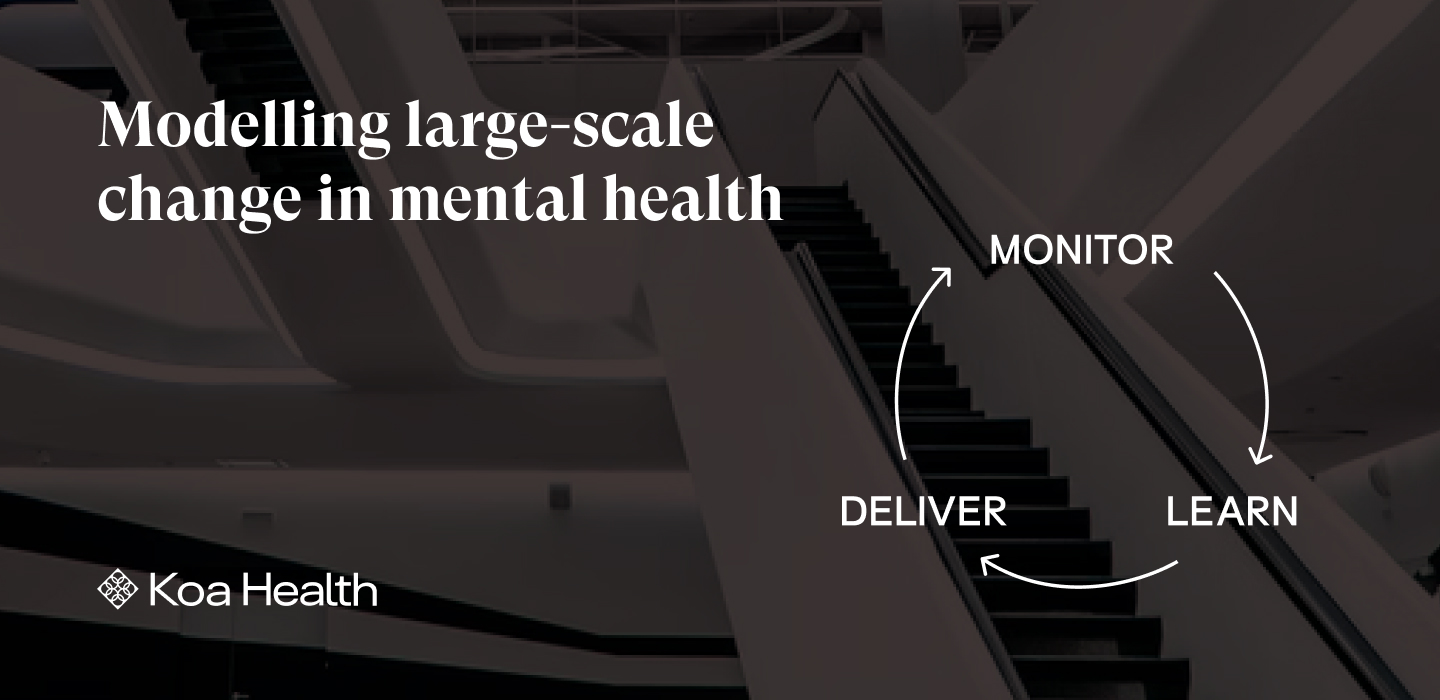Dr Sophie Dix, VP of Content and Nicola Hemmings, Workplace Scientist at Koa Health, discuss the potential for large-scale change in mental healthcare & why it’s needed
There’s no avoiding the truth of the current situation: existing systems (public and private) for mental health are overloaded and failing people across the full range of mental health – from those who need urgent 1:1 attention to those who could use access to preventative and self-guided resources to maintain their mental wellbeing. (1) To become the accessible, inclusive source of support that the British public needs it to be, mental healthcare in the UK needs a significant overhaul.
Last year, the estimated cost of mental health-related expenses across private and public sectors was £53-56 billion. (2) Wait times for mental health services via the NHS are 18 weeks or longer, with 1.5 million people in England waiting for mental health treatment. (3)
This impacts the majority of the population: 74% of UK adults have felt overwhelmed or unable to cope over the last year, (4) and they are not able to seek the help they need as 70-75% of people with a diagnosable mental illness receive no treatment whatsoever. (5)
However, making the large-scale change needed to truly address the situation requires careful consideration, significant planning and perhaps most importantly, consistent but flexible action over time – the willingness and ability to pivot quickly due to new insights must not be neglected. Then there are the barriers to address and overcome – from budgetary and time concerns raised by organisations to individuals’ worries around privacy, inconvenience and the stigma associated with seeking out care.
So how can organisations (CCGs and others within the NHS, private health insurers, and employers) transform mental healthcare?

1. Incorporate inclusion into every step
Issues of access to mental healthcare disproportionately affect minority populations. (6) So, as you work towards large-scale change to make mental healthcare more accessible and effective, consider any actions and key themes to address from diverse perspectives. Ensuring that people from different socioeconomic and cultural backgrounds have visibility and a voice in the change process will help ensure your ‘big picture’ is as complete and inclusive as possible.
No one solution or modality will address everyone equally. Mental health ranges across a continuum from mentally ill to mentally well. Global, regional and personal circumstances impact it, and individuals’ needs will vary depending on all of these factors at any given moment in time. But inclusion becomes much more possible with flexible, accessible resources. This has the added benefit of helping everyone, not just those in the greatest need of adjustments.
2. Gain momentum with a quick-fix approach
While large-scale change is 100% a long-term project, focusing on small, quickly implemented steps and feedback loops can help sustain forward motion and keep your organisation from getting stuck on minor details. Instead of spending months or years creating a down-to-the-letter plan for mental health that may become irrelevant by the time it is released, keep it simple. Select a few first steps that align with your budget and set a deadline to roll them out and collect insights for future iterations.
Ideally, your initial actions involve something your organisation feels will resonate and return fast results. It could mean implementing a well-being check-in policy between line managers and employees or doctors and patients or offering free access to a mental health resource or tool.

3. Monitor your results
To ensure you can evaluate what’s working or not, put systems in place to track your results and gather quantitative data. This data can also help you decide where to allocate further resources. If your initial steps involve third-party tech, you’re likely to have access to data from the provider to leverage.
Qualitative feedback also offers an essential perspective, so include additional ways for those affected by your initiative to share their thoughts. Google forms, surveys, or a contact email or phone number are good places to start. Be sure that however you’re monitoring your results you’re keeping in mind confidentiality and data security concerns. (7)
4. Learn, pivot and repeat as needed
After taking your first steps, evaluate your results. What’s resonated and what hasn’t? Has the initiative driven progress in notable ways? What key themes have emerged around mental health needs at your organisation?
Use any lessons or insights obtained from your initial effort to decide on the next steps. After each step and subsequent evaluations and iterations, you’ll have more information to help you continue elaborating your long-term plan.
Large-scale change is by definition challenging to implement, and without resilience, it becomes nearly impossible. For more on how to build strength and wellbeing at your organisation, download our 30-page resource, Building organisational resilience: The business case for employee wellbeing.

References
(1) https://www.openaccessgovernment.org/scalable-accessible-mental-health-for-all/131668/
(2) https://www2.deloitte.com/content/dam/Deloitte/uk/Documents/consultancy/deloitte-uk-mental-health-report-2022.pdf
(3) https://www.rcpsych.ac.uk/news-and-features/latest-news/detail/2021/10/06/workforce-shortages-in-mental-health-cause-painfully-long-waits-for-treatment
(4) https://www.mentalhealth.org.uk/news/stressed-nation-74-uk-overwhelmed-or-unable-cope-some-point-past-year
(5) https://mhfaengland.org/mhfa-centre/research-and-evaluation/mental-health-statistics/
(6) https://irr.org.uk/research/statistics/health/
(7) https://www.koahealth.com/blog-post/can-a-wellbeing-app-be-ethical/
Please note: This is a commercial profile.
© 2019. This work is licensed under a CC BY 4.0 license.











